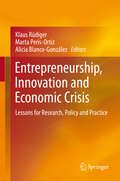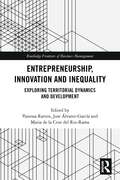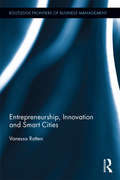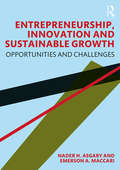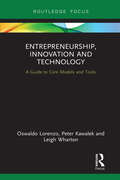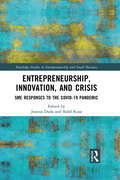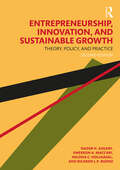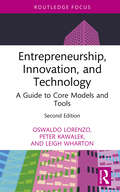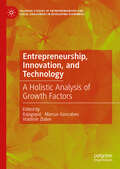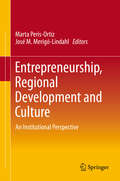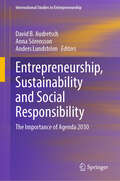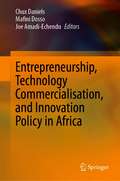- Table View
- List View
Entrepreneurship, Innovation and Economic Crisis
by Marta Peris-Ortiz Klaus Rüdiger Alicia Blanco-GonzálezThis book looks at entrepreneurship and innovation as ways out of the economic crisis in Europe and other regions, and examines the main theoretical issues and practices related to this analysis. The volume addresses such questions as: From an institutional perspective, how do economic crisis conditions affect different types of entrepreneurs and entrepreneurship? Is it useful for public policymakers and entrepreneurs to understand the basic characteristics of entrepreneurial activity, relations between the institutional environment and entrepreneurship and among entrepreneurship, innovation and social change? Featuring case studies from several industries and countries, and a variety of methodological, theoretical, and empirical approaches, the authors build a compelling narrative on the dynamics of entrepreneurship and innovation as drivers of economic growth and organizational renewal. They demonstrate that the strategic and operational relationships that entrepreneurship creates within and outside the enterprise are a fundamental route for leading and mobilizing economic and social resources that permit innovation at the organizational level and in relationships with suppliers, customers, and other stakeholders - in turn, enabling technological innovation, creating new revenue streams through new productive activities and new demand, and ultimately facilitating emergence from economic crisis. The authors consider social, gender, and generational aspects of entrepreneurship, as well as the institutional conditions necessary to promote entrepreneurial activity.
Entrepreneurship, Innovation and Inequality: Exploring Territorial Dynamics and Development (Routledge Frontiers of Business Management)
by Vanessa Ratten Jose Álvarez-García Maria De La Cruz Del Rio-RamaThis book hopes to stimulate discussion about how entrepreneurship and innovation contribute to growing inequalities in territories. This will help bridge the gap between research and practice on the role of territory dynamics and regional development. The book begins by examining the growing inequality in regions, which has resulted in lagging economic development. The need to shift current economic policy towards spatial inequality through harnessing the innovative capabilities of regions is examined. The book puts forth a case for reversing the inequality that is evident in lagging regions as a way to reinvigorate territories. The book should appeal to researchers, policy makers, business leaders and the general public interested in territorial dynamics and development.
Entrepreneurship, Innovation and Regional Development: An Introduction
by Jay MitraThe fields of entrepreneurship, innovation and regional development are inextricably linked, with people, organisations, and the environment or their location, forming the main building blocks in an integrated model of value creation. This second edition of a key textbook draws on the diversity of approaches in these areas to produce a unified understanding of this important subject and its sub-sets. The author connects theory and practice using references to academic studies as well as industry sources. The importance of technology is highlighted throughout to demonstrate the value of new technology-based ventures and the role of technology for innovation in both organisational and spatial contexts. The economic and social contexts of entrepreneurship are covered in dedicated chapters offering an appreciation of multiple perspectives on key themes of growth and development. Drawing on insights and concepts from a wide range of disciplines such as business, sociology, economics, geography and management, this unique textbook introduces entrepreneurship to students from different backgrounds and varied interests. With a range of new case studies and coverage of emerging themes such as smart cities, ecosystems, female entrepreneurship, and social and human capital, this book provides an expert exposition of the elaborate empire of entrepreneurship.
Entrepreneurship, Innovation and Smart Cities (Routledge Frontiers of Business Management)
by Vanessa RattenThere has been increased emphasis on smart cities due to the economic, environmental and technological shifts that have impacted on society. This book focuses on how cities are becoming smarter, more innovative and entrepreneurial due to the increased pressures placed on them from societal changes in the global business environment. The book defines a smart city as an urban or rural development that integrates technology to enhance a city’s assets, which may include community services, parkland, education, transportation and energy sources. The book aims to examine the role that innovation has in creating smart cities by focusing on issues such as public transport, use of energy efficiency and sustainability practices. It helps to shed understanding on how cities have become smarter in the way they handle increased migration to urban and rural areas and decrease the strain on public finances.
Entrepreneurship, Innovation and Sustainability
by Marcus WagnerThis book addresses the intersection of entrepreneurship, innovation and sustainability (EIS), presenting high-quality research illuminating the relationship between the three fields. The EIS nexus is particularly relevant from a European point of view given the focus of the European Commission on corporate social responsibility (CSR) and sustainability, as well as their prominent role within the European Union in general. Also, the rapid economic growth witnessed especially in the BRIC countries in recent years requires that firms reconcile sustainability aspects with profitability and innovation, and entrepreneurs are seen as key diffusers of these aims. Sustainability requires both radical and incremental innovation at many different levels (technology, product, process, system). In many cases, such innovations come from small and medium-sized enterprises and so the role of the entrepreneur is key to their success. The book is split into six sections. The first section examines the nexus in detail focusing on system-oriented connectivity between sustainability, innovation and entrepreneurship. The second section looks at how to nurture corporate entrepreneurship for sustainability; and the third considers "mature" industries such as automotives, chemicals and electronics and how sustainability aspects can be integrated into innovation process and strategy. The fourth section examines the nexus through the lens of developing countries in Africa. Sustainable entrepreneurship is identified as a hugely beneficial way to foster development. The fifth section of the book concentrates on SMEs; and finally the EIS nexus is approached from a network perspective and focuses on inter-organisational partnerships, which are often an important facilitator or spark for EIS initiatives.This book will prove to be essential for researchers in the EIS nexus and be of invaluable help to practitioners, governments and inter-governmental bodies attempting to encourage sustainable entrepreneurship and innovation.
Entrepreneurship, Innovation and Sustainable Growth: Opportunities and Challenges
by Nader H. Asgary Emerson A. MaccariEntrepreneurship and innovation play a vital role in fostering sustainable development. Advances in technology and communications have both transformed the process of business as well as strengthened the role of entrepreneurship in developed and developing countries. This important book is the first to provide the fundamental concepts and applications for faculty and students in this field, and also serves as a professional reference for practicing entrepreneurs and policymakers. Each chapter provides a clear guide to the conceptual and practical elements that characterize entrepreneurship and the process of new venture formation, including functional strategies in key areas such as marketing, information technology, human resources management, and accounting and finance. Questions and exercises are presented throughout in order to encourage discussion and problem-solving. A quick summary of the important concepts and definitions are also provided. Keeping practicality as the book’s core aim, all chapters include a long case study to set the scene and then draw upon shorter cases from both developing and developed countries to reinforce key learning objectives and the real-world application of the book’s core concepts.
Entrepreneurship, Innovation and Technology: A Guide to Core Models and Tools
by Oswaldo Lorenzo Peter Kawalek Leigh WhartonThe combination of entrepreneurship, innovation and technology has become the source of disruptive business models that transform industries and markets. The integrative understanding of these three drivers of today’s economy is fundamental to business. Entrepreneurship, Innovation and Technology aims to connect core models and tools that are already created by well-known authors and scholars in order to deliver a unique guide for building successful business models through the adoption of new technologies and the use of effective innovation methods. The book goes through the entrepreneurial lifecycle, describing and applying core innovation models and tools such as the business model canvas, lean startup, design thinking, customer development and open innovation, taking into consideration disruptive technologies such as mobile internet, cloud computing, internet of things and blockchain. Finally the book describes and analyses how successful cases have been applying those models and technologies. With the mix of an academic and practitioner team, this book aims to go against the grain by its positioning of entrepreneurship in the modern technology economy. This book will prove to be a vital text for any student, specialist or practitioner looking to succeed in the field.
Entrepreneurship, Innovation, and Crisis: SME Responses to the COVID-19 Pandemic (Routledge Studies in Entrepreneurship and Small Business)
by Joanna DudaEntrepreneurship, Innovation, and Crisis: SME Responses to the COVID-19 Pandemic aims to address the conditions for the operations of SMEs during the time of the COVID-19 pandemic as well as the governmental support for entrepreneurs in such industries as tourism, manufacturing, recycling, education, and printing as well as the creative industry. Through the presentation of various strategies for the functioning and development of companies under crisis conditions along with new management approaches for coping with them, this book discusses the conditions for the operations of SMEs during the time of the COVID-19 pandemic as well as the support for entrepreneurs that has been offered by the governments of different countries. This approach will allow our results to be useful for a wide audience – making it especially valuable to researchers, academics, policymakers, and advanced students who are interested in crises, entrepreneurship, small and medium-sized enterprises, and strategic management.
Entrepreneurship, Innovation, and Sustainable Growth: Theory, Policy, and Practice
by Nader H. Asgary Emerson A. Maccari Heloisa C. Hollnagel Ricardo L.P. BuenoEntrepreneurship and innovation play a vital role in fostering sustainable development. Advances in technology and communications have both transformed the process of business and strengthened the role of entrepreneurship in developed and developing countries. This new edition of Entrepreneurship, Innovation, and Sustainable Growth provides the fundamental concepts and applications for faculty and students in this field, and also serves as a professional reference for practicing entrepreneurs and policymakers. Each chapter provides a clear guide to the conceptual and practical elements that characterize entrepreneurship and the process of new venture formation, including functional strategies in key areas such as marketing, information technology, human resources management, and accounting and finance. Updated throughout to take account of recent developments in topics such as environmental impacts, diversity and inclusion, and COVID-19, the book is a comprehensive and holistic approach to the theory, policy, and practice of entrepreneurship and innovation. Keeping practicality as the book’s core aim, all chapters include a long case study to set the scene and then draw upon shorter cases from both developing and developed countries to reinforce key learning objectives and the real-world application of the book’s core concepts. With new questions and exercises presented throughout in order to encourage discussion and problem-solving, quick summaries of the important concepts and definitions, and extensive support for lecturers and students, Entrepreneurship, Innovation, and Sustainable Growth, Second Edition, is ideal for students at undergraduate and postgraduate level.
Entrepreneurship, Innovation, and Technology: A Guide to Core Models and Tools
by Oswaldo Lorenzo Peter Kawalek Leigh WhartonThe combination of entrepreneurship, innovation, and technology has become the source of disruptive business models that transform industries and markets. The integrative understanding of these three drivers of today’s economy is fundamental to business. Entrepreneurship, Innovation, and Technology aims to connect core models and tools that are already created by well-known authors and scholars in order to deliver a unique guide for building successful business models through the adoption of new technologies and the use of effective innovation methods. The book goes through the entrepreneurial lifecycle, describing and applying core innovation models and tools such as the business model canvas, lean startup, design thinking, customer development, and open innovation, while taking into consideration disruptive technologies such as mobile internet, cloud computing, internet of things, and blockchain. Finally, the book describes and analyzes how successful cases have been applying those models and technologies. With the mix of an academic and practitioner team, this book aims to go against the grain by its positioning of entrepreneurship in the modern technology economy. This book will prove to be a vital text for any student, specialist, or practitioner looking to succeed in the field.
Entrepreneurship, Innovation, and Technology: A Holistic Analysis of Growth Factors (Palgrave Studies of Entrepreneurship and Social Challenges in Developing Economies)
by Rajagopal Vladimir Zlatev Marcus GoncalvesThis book critically analyzes the convergence of success and failure factors of entrepreneurship, innovation, technology, business practices, public policies, and consumer values affecting the growth of the global-local business to support regional development. It provides a platform for researchers to learn entrepreneurial perspectives of various countries and develop pro-active entrepreneurship models. Chapters in this anthology share new impetus on global entrepreneurship and technology in future.
Entrepreneurship, Polycentrism, and Elites: Local Industrial Development in Modern Italy
by Carlo Carboni Francesco OraziThe book is a cross-section of the over all Italian development. Italy can be considered a microcosm that contains all the imbalances and territorial differences that can be observed in the European macro-areas. Its north can now be considred integrated with the more developed European continental shelf. The Centre represents a local development in transition to a more visible technological change. The late south risks accumulating more socio-economic backwardness. For these reasons, we believe this volume is useful, with just a few pages presenting one of the most interesting cases of local industrial development, outside the mainstream of the industrial economy which saw in Fordism and Taylorism the best way for industrializaion. Here, on the contrary, it is argued that big fish cannot always consume the smallest one that flickers faster and its flexibility, that has social roots, can be an advantage in global markets. Technology appears to be the key to the future. Please note: This title is co-published with Aakar Books, New Delhi. Print edition not for sale in South Asia (India, Sri Lanka, Nepal, Bangladesh, Pakistan, Maldives or Bhutan)
Entrepreneurship, Regional Development and Culture
by Marta Peris-Ortiz José M. Merigó-LindahlThe aim of this book is to analyze the relationships among entrepreneurship, regional development and culture in the current economy. Using an institutional approach, it examines the main theoretical issues and practices and their effect on different dimensions of society and the economy. Business creation is considered a key element of economic growth, innovation and employment. In recent years, entrepreneurial scholars have studied the factors that affect entrepreneurship and drive economic growth. In doing so, these scholars have aimed to understand what promotes entrepreneurial activity and also how to improve the development of regions or countries to increase wealth in society. The institutional approach can be applied to the entrepreneurship field to understand the phenomenon of entrepreneurship. This view considers the role of environment in the decision to create a company, which is critical to entrepreneurship, innovation and economic growth. Environment relates to legal aspects, public policy and support services (formal institutions) but is especially important in terms of sociocultural context (informal institutions). The creation of new ventures is greatly influenced by culture. Furthermore, it is important to highlight the influence of entrepreneurship on regional development, specifically through job creation, stimulation of economic growth and innovation. Thus, entrepreneurship, regional development and culture are fundamental for understanding economic growth and development as well as other phenomena such as technology transfer or women's entrepreneurship. Featuring contributions and cases studies from various countries and sectors, this volume provides an essential reference for scholars, academics, and researchers in entrepreneurship, business management, innovation and economics.
Entrepreneurship, Self-Employment and Retirement
by Natalie Sappleton Fernando LourençoEntrepreneurship, Self-Employment and Retirement presents a collection of nine studies which contribute to a more robust and richer understanding of entrepreneurship, self-employment and retirement in a diversity of settings, including the Netherlands, Canada, the United Kingdom, Singapore and the US, by drawing on both qualitative and quantitative data. By presenting these diverse accounts of pre- and post-retirement self-employment, this volume broadens and enriches existing knowledge about this distinct form of entrepreneurship, and contributes theoretically, methodologically and empirically to an embryonic yet fascinating field.
Entrepreneurship, Small Business and Public Policy: Evolution and revolution (Routledge Masters in Entrepreneurship)
by Robert J. BennettPublic policy interventions aimed at encouraging, supporting and developing small businesses are important for understanding entrepreneurship and small business management. This textbook is the first to provide teachers and students with a resource that gives an overview of how institutional and policy structures interact with small firm start-ups, continuation and succession/failures. Beginning with a brief introduction to policy processes, the text covers the main policy instruments for entrepreneurial market entry and start-up support, for on-going small business advice and financial support, and succession planning. It particularly focuses on policies that improve the Business Enabling Environment through macroeconomic policy, institutional reform, and deregulation of bureaucratic burdens. Theoretical rigour is complemented by detailed assessments of current policies around the world, including USA, advanced and emerging economies and Policy support from global institutions such as the World Bank and the ILO are included. Written by a pre-eminent scholar of public policy and entrepreneurship, this textbook provides a concise but thorough introduction to the subject for Master's students internationally. Policy recommendations in the author's conclusion also highlight the book's value to policy-makers as they adapt to the globalized, digital world.
Entrepreneurship, Sustainability and Social Responsibility: The Importance of Agenda 2030 (International Studies in Entrepreneurship #48)
by David B. Audretsch Anders Lundström Anna SörenssonThis edited collection unveils the pivotal role of entrepreneurship in realizing the 2030 Agenda for Sustainable Development. Global scholars converge to scrutinize entrepreneurship's centrality in the transformative framework endorsed by the United Nations. Encompassing nuanced examinations, the volume surveys evolving perspectives on Agenda 2030, appraises policy implications and scrutinizes entrepreneurship's potency as a change catalyst. Chapters deal with practical applications, assessing the Agenda's efficacy in nurturing local enterprises. Exploring the interplay between corporate social responsibility and entrepreneurship, the book analyzes the potential of tailoring Sustainable Development Goals to diverse contexts. Furthermore, the book critically analyzes implementation factors and prevailing research gaps in public sector integration. In sum, this compendium exemplifies Agenda 2030's role in driving multifaceted political and local metamorphoses across sectors and is useful for researchers and policymakers alike.
Entrepreneurship, Technological Change and Circular Economy for a Green Transition: Research Contributions for a More Productive Environment (Studies on Entrepreneurship, Structural Change and Industrial Dynamics)
by Luísa Cagica Carvalho Conceição Rego Adriana Backx Noronha Maria Raquel Lucas María Isabel Sánchez-HernándezThis book is a comprehensive and timely publication that aims to be an essential reference source, building on contemporary research in the fields of circular economy and green transition in relation to entrepreneurship and technological change. This book aims to address a range of approaches including, but not limited to, the conceptual, theoretical, and case studies related to the topics of the book. The topical focus is on how circular economy contributions, energy infrastructure, green transition, and digital transformation are contributing to attaining the Sustainable Development Goals (SDGs). The expert contributions in the book particularly help us learn more about the answers to the current challenges of the green transition as well as how the necessary technological change will impact, mainly, the enterprises and the field of agriculture production and agribusiness. The book is mainly intended to support an academic audience (academics, university teachers, researchers, and post-graduate students – both Master's and Doctorate levels). In addition, this book will be of benefit to institutional experts, developers, and researchers in the fields of Entrepreneurship and technological change in circular economy and green transition.
Entrepreneurship, Technology Commercialisation, and Innovation Policy in Africa
by Joe Amadi-Echendu Chux Daniels Mafini DossoThis book provides a comprehensive overview of role of entrepreneurship, technology commercialisation and innovation policy for the achievement of economic development and prosperity in African societies. It adopts a broad innovation systems approach. The book examines entrepreneurship, innovation, and technology commercialisation alongside context-specific factors associated with them. It also provides an interdisciplinary perspective, by discussing the above disciplines in a connected way. This book is presented in three distinct parts. It starts by discussing entrepreneurship and the state of the entrepreneurial ecosystem in Africa. It then moves on to present technology commercialisation in Africa, before finally discussing the future directions for entrepreneurship, technology commercialisation and innovation policy. This broad picture provided in the book enables the reader to grasp the relevant messages, whilst the detailed analysis applies world-class theories and frameworks to deepen the readers understanding of key concepts and issues examined.
Entrepreneurship: A Contemporary & Global Approach
by David Deakins Jonathan M. ScottThis popular and well received standard text on Entrepreneurship has been completely revised and updated for the second edition. The text retains the favourably reviewed features of the first edition which include the importance of context, diversity and differing international entrepreneurial practice, yet is underpinned by coverage and application of relevant theory. In particular, the text now contains important and entirely new sections on entrepreneurship in the face of multiple global crises, evidence on entrepreneurial resilience, new case study material on examples of international entrepreneurship from developing countries including a new section on Entrepreneurship in Sub-Saharan Africa, new case material on ‘clean technology’ entrepreneurship and on green finance, and a new chapter on Indigenous Entrepreneurship. All chapters have been completely updated to reflect increased diversity and the place of Entrepreneurship in the context of multiple global crises. The text retains the pedagogic features of the first edition which are consistent throughout the text and include learning outcomes, boxed case studies with discussion questions, policy and practical issues, summaries of each chapter, recommended reading and suggested assignments. The text is complemented by online support material for tutors.
Entrepreneurship: A Contemporary & Global Approach
by David Deakins Jonathan M. ScottThis popular and well received standard text on Entrepreneurship has been completely revised and updated for the second edition. The text retains the favourably reviewed features of the first edition which include the importance of context, diversity and differing international entrepreneurial practice, yet is underpinned by coverage and application of relevant theory. In particular, the text now contains important and entirely new sections on entrepreneurship in the face of multiple global crises, evidence on entrepreneurial resilience, new case study material on examples of international entrepreneurship from developing countries including a new section on Entrepreneurship in Sub-Saharan Africa, new case material on ‘clean technology’ entrepreneurship and on green finance, and a new chapter on Indigenous Entrepreneurship. All chapters have been completely updated to reflect increased diversity and the place of Entrepreneurship in the context of multiple global crises. The text retains the pedagogic features of the first edition which are consistent throughout the text and include learning outcomes, boxed case studies with discussion questions, policy and practical issues, summaries of each chapter, recommended reading and suggested assignments. The text is complemented by online support material for tutors.
Entrepreneurship: A Contemporary & Global Approach
by Professor David Deakins Dr. Jonathan M. ScottWritten by a team of leading international scholars, this new book treats entrepreneurship as an ever-evolving social phenomenon, and explores the recent trends that impact it, such as: digitisation; disruptive technologies; the rise of the 'gig' economy and; the growing importance of community-based and social entrepreneurship. Including a mixture of case studies, examples, consideration of policy issues and exercises, this text provides practical perspectives of Entrepreneurship in support of key theory, while discussion questions, suggested reading and assignments help situate and test understanding.
Entrepreneurship: A Contemporary & Global Approach
by Professor David Deakins Dr. Jonathan M. ScottWritten by a team of leading international scholars, this new book treats entrepreneurship as an ever-evolving social phenomenon, and explores the recent trends that impact it, such as: digitisation; disruptive technologies; the rise of the 'gig' economy and; the growing importance of community-based and social entrepreneurship. Including a mixture of case studies, examples, consideration of policy issues and exercises, this text provides practical perspectives of Entrepreneurship in support of key theory, while discussion questions, suggested reading and assignments help situate and test understanding.
Entrepreneurship: A Global Perspective (Routledge Masters in Entrepreneurship)
by Stephen RoperEntrepreneurs exist in every country but the nature and level of entrepreneurial activity differs remarkably. Why is this? What shapes the level of entrepreneurial activity in each country? What defines entrepreneurial activity? As more and more teaching and research into entrepreneurship reflects its often international nature, the need for literature reflecting this grows. This concise new textbook provides an introduction to topics in entrepreneurship in a global context; focusing on how enterprise works across the world. Important topics such as financing, innovation and (anti) social enterprise are discussed in detail throughout the text and examples and case studies are used to illustrate the application of different theoretical and conceptual approaches to entrepreneurship and the role it plays in developed, emerging and transitional economies. Entrepreneurship: A Global Perspective is suitable for both final year undergraduate and postgraduate courses in enterprise and is likely to appeal particularly to student groups with a strong international element.
Entrepreneurship: A New Perspective (Routledge Studies in Global Competition #Vol. 22)
by Thomas GrebelThe entrepreneur has been neglected over the years in formal economic theorizing. Previously there has been only eclectic theories such as human capital theory and network dynamics which discuss certain perspectives of entrepreneurial behaviour. This insightful book closes this gap in entrepreneurship literature. Inspired by modern physics, author Thomas Grebel brings together an evolutionary methodology, along the way implicating quantum, graph, and percolation theory. Here, Grebel has provided a synthesis of all the main theories of entrepreneurship. Taking an interdisciplinary approach to the subject, this fascinating book opens up new ideas in modelling and the original thinking contained within will be of interest to all those working in the area of business and management as well as those in economics.
Entrepreneurship: A Process Perspective (2nd Edition)
by Robert A. Baron Scott Andrew ShaneCurrent, comprehensive, and cutting edge, ENTREPRENEURSHIP: A PROCESS PERSPECTIVE equips potential entrepreneurs with the tools and insight for success. With solid theory and relevant examples, this thorough resource covers the entire process of building a business. Seasoned instructors and entrepreneurial authorities, Professors Baron and Shane deliver a practical, applied process approach with a multidisciplinary perspective, drawing on knowledge from the studies of economics, psychology, and other areas. The book begins with recognizing opportunity and building a team, and then moves through assembling finances, the business plan, legal issues, marketing, growth, and exit strategies. Rather than getting bogged down in excessive discussions of theory, Baron and Shane use real-world examples to illustrate how students can apply chapter concepts to their own business ventures. Thoroughly updated and revised based on student and professor feedback, the second edition adds a chapter on legal issues specific to entrepreneurs--including intellectual property considerations--and an appendix on key accounting principles entrepreneurs should know. A new chapter on growth strategies for new ventures is coupled with a chapter on managing new ventures for growth. In addition, new boxed features shed light on common myths and misperceptions about entrepreneurship. The book is also packed with hands-on applications--including a case written specifically for each chapter--giving students experience putting text concepts into real-world action.
